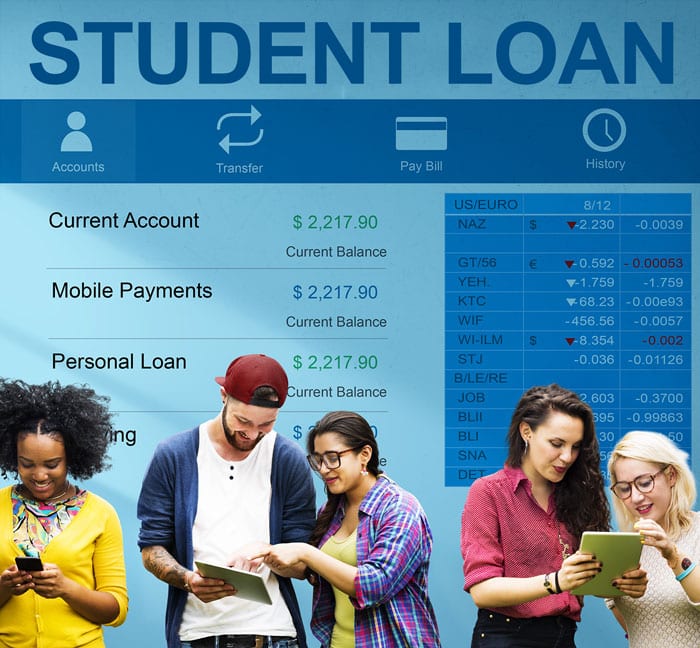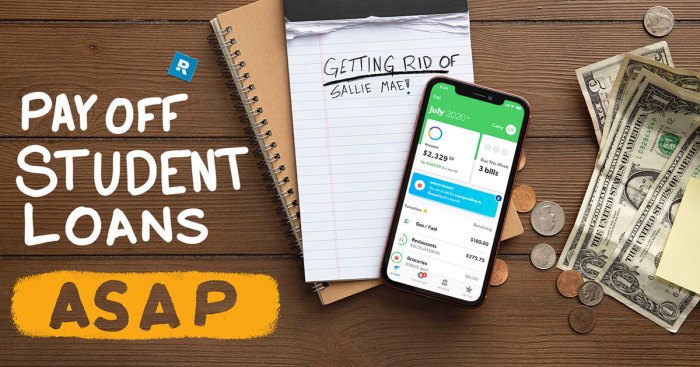
The question of early student loan repayment often sparks a mix of hope and uncertainty. Many borrowers dream of escaping the weight of student loan debt sooner, but concerns about potential penalties often hold them back. This exploration delves into the intricacies of early repayment, examining various loan types, repayment strategies, and the overall financial implications to help you make informed decisions about your debt.
Understanding your specific loan terms is crucial. Different loan types, such as federal subsidized and unsubsidized loans, private loans, and even the specific terms within your loan agreement, can significantly impact whether early repayment incurs penalties. This guide will navigate you through the complexities, clarifying the potential benefits and drawbacks of accelerating your payments.
Understanding Loan Terms and Conditions

Paying off student loans early can be advantageous, but it’s crucial to understand your loan agreement first. Different loan types have varying terms and conditions, and some may include penalties for early repayment. Carefully reviewing your loan documents is essential to avoid unexpected fees.
Types of Student Loans and Repayment Terms
Student loans generally fall into two main categories: federal and private. Federal loans, offered by the U.S. government, often have more flexible repayment options and potentially lower interest rates than private loans. Repayment terms for federal loans vary depending on the loan type (e.g., subsidized, unsubsidized, PLUS loans) and your repayment plan (e.g., standard, graduated, income-driven). Private loans, offered by banks and other financial institutions, have terms and conditions set by the lender. These terms can vary significantly, impacting your monthly payment amount and overall repayment period. Understanding the specifics of your loan type is key to determining the feasibility and potential consequences of early repayment.
Penalties for Early Repayment
While many federal student loans do not charge a penalty for early repayment, some private loans might. These penalties can take several forms, including prepayment penalties (a fee for paying off the loan early), increased interest charges, or other fees Artikeld in the loan agreement. The amount of any penalty will vary depending on the lender and the terms of the loan. It is crucial to check your loan documents for specific clauses relating to prepayment. Many private lenders incentivize longer loan terms through lower monthly payments, potentially offsetting the benefit of early repayment if a penalty applies.
Examples of Loan Agreements with Early Repayment Penalties
A common example of an early repayment penalty clause in a private loan agreement might state something like: “A prepayment penalty of 2% of the outstanding principal balance will be applied if the loan is paid in full within the first three years of the loan term.” Another example could involve an increased interest rate for a specified period if early repayment occurs. These penalties are often designed to compensate the lender for lost interest income. The specific wording and amount of the penalty will differ significantly between loan providers and loan products. Always carefully review the entire loan agreement before signing.
Comparison of Student Loan Types and Early Repayment Policies
| Loan Type | Lender | Typical Interest Rate | Early Repayment Penalty? |
|---|---|---|---|
| Federal Subsidized Loan | U.S. Department of Education | Variable, depends on interest rate at time of loan disbursement | Generally No |
| Federal Unsubsidized Loan | U.S. Department of Education | Variable, depends on interest rate at time of loan disbursement | Generally No |
| Federal PLUS Loan | U.S. Department of Education | Variable, depends on interest rate at time of loan disbursement | Generally No |
| Private Student Loan | Various Banks and Credit Unions | Variable, depends on creditworthiness and market rates | Possibly, check loan agreement |
Financial Implications of Early Repayment
Paying off student loans early offers significant long-term financial advantages, impacting your overall financial health and future opportunities. Accelerated repayment reduces the total interest accrued over the loan’s lifespan, freeing up funds for other financial goals like saving for a down payment on a house, investing, or building an emergency fund. This section explores the financial benefits and challenges associated with early loan repayment.
Early repayment dramatically reduces the total interest paid over the life of your loan. Standard repayment plans stretch payments over a longer period, leading to significantly higher interest accumulation. By paying extra towards your principal, you shorten the loan term and minimize the amount of interest you ultimately pay.
Total Interest Savings with Early Repayment
Consider a hypothetical $30,000 student loan with a 5% interest rate and a 10-year repayment plan. Under the standard plan, the total interest paid would be approximately $6,000. However, by making extra payments of $100 per month, you could potentially pay off the loan in roughly seven years, reducing the total interest paid to approximately $3,500. This represents a savings of $2,500, a substantial amount that could be redirected towards other financial objectives. This example highlights the significant impact of even small, consistent extra payments.
Potential Financial Obstacles to Early Repayment
Several factors can hinder early repayment efforts. Unexpected expenses, such as medical bills or car repairs, can disrupt carefully planned budgets. Changes in employment status, like job loss or reduced income, can also make extra payments challenging. Furthermore, lifestyle choices and competing financial priorities, such as saving for a down payment or investing, might necessitate a more gradual repayment strategy. Prioritizing debt repayment while maintaining a healthy financial balance requires careful planning and budgeting.
Hypothetical Budget for Accelerated Loan Repayment
Let’s imagine a hypothetical budget for someone aiming to repay their student loans early. This budget prioritizes loan repayment while maintaining essential living expenses and allowing for some savings.
| Category | Monthly Allocation |
|---|---|
| Housing (Rent/Mortgage) | $1,000 |
| Food & Groceries | $400 |
| Transportation | $200 |
| Utilities | $150 |
| Student Loan Payment (Regular) | $300 |
| Student Loan Payment (Extra) | $200 |
| Savings | $150 |
| Entertainment & Miscellaneous | $200 |
This budget allocates a significant portion of the income towards accelerated loan repayment, demonstrating a commitment to achieving financial freedom sooner. The remaining funds cover essential expenses and allow for modest savings. This example illustrates how prioritizing loan repayment can be incorporated into a realistic budget, though individual circumstances will necessitate adjustments. The key is to identify areas where expenses can be reduced or reallocated to support early repayment goals.
Impact on Credit Score and Financial Health
Paying off student loans early can significantly impact both your credit score and your overall financial health. While the immediate effect might not be as dramatic as some anticipate, the long-term benefits can be substantial. Understanding these effects is crucial for making informed financial decisions.
Early repayment primarily affects your credit utilization ratio, a key factor in your credit score calculation. This ratio represents the amount of credit you’re using compared to your total available credit. By paying down your student loans, you reduce your overall debt and, consequently, your credit utilization ratio. A lower ratio generally translates to a higher credit score. However, it’s important to remember that other factors, such as payment history and length of credit history, also contribute to your credit score. Prematurely closing credit accounts can sometimes negatively impact your score, so carefully consider the implications before making any drastic changes.
Credit Score Improvement and its Benefits
A higher credit score, resulting from responsible debt management like early student loan repayment, opens doors to numerous financial advantages. Lenders view individuals with higher credit scores as lower risk, leading to more favorable loan terms. This translates to lower interest rates on mortgages, auto loans, and even personal loans, saving you considerable money over the life of the loan. Additionally, a good credit score can increase your chances of approval for credit cards with better rewards programs and lower fees. For instance, someone with a credit score of 750 might qualify for a mortgage with a 3% interest rate, while someone with a 650 score might face a 5% rate—a significant difference in monthly payments and total interest paid over the loan’s term.
Credit Score Impact of Different Repayment Strategies
The impact of different repayment strategies on your credit score is subtle but noticeable over time. While aggressively paying off loans improves your credit utilization, a more gradual approach still demonstrates responsible debt management. The key is consistency. Inconsistent payments can negatively affect your score, regardless of the repayment speed.
| Repayment Strategy | Credit Utilization Impact | Credit Score Impact (Potential) | Long-Term Financial Impact |
|---|---|---|---|
| Aggressive Early Repayment | Significant Reduction | Positive, potentially substantial increase | Lower interest rates on future loans, improved financial flexibility |
| Steady, Consistent Repayment | Gradual Reduction | Positive, gradual increase | Steady improvement in creditworthiness, building a positive credit history |
| Minimum Payment Only | Little to no reduction | Minimal or no positive impact, potentially negative if combined with other high utilization accounts | Higher interest payments, limited financial flexibility, potential difficulty securing future loans |
| Inconsistent Payments | Irrelevant | Negative, potentially significant decrease | Difficulty securing loans, higher interest rates, damaged credit history |
Practical Considerations and Resources

Successfully paying off student loans early requires careful planning and execution. This section details the practical steps involved, provides helpful resources, and offers examples of effective communication strategies with your loan servicer. Remember, proactive management and clear communication are key to achieving your goal.
Initiating early repayment involves several key steps. First, you need to determine the exact amount you can afford to pay beyond your minimum monthly payment. This requires careful budgeting and consideration of your overall financial situation. Next, contact your loan servicer to confirm the process for making extra payments. Many servicers have online portals where you can easily submit additional payments. Finally, track your payments diligently to ensure they are properly applied to your principal balance. This will help you monitor your progress and stay motivated.
Steps Involved in Initiating Early Repayment
The process of initiating early repayment is straightforward, but requires proactive engagement with your loan servicer. This involves several key actions that, when taken systematically, can significantly reduce the loan repayment period.
- Determine extra payment amount: Analyze your budget to identify how much extra you can comfortably contribute each month or as a lump sum.
- Contact your loan servicer: Confirm their preferred method for making extra payments (online portal, mail, phone). Inquire about any potential fees or restrictions.
- Make the extra payment: Submit the extra payment through the designated method, clearly indicating it’s an extra payment towards the principal balance.
- Track payment application: Regularly check your loan statement to verify the extra payments are correctly applied to your principal balance, reducing your overall loan amount.
Resources and Tools for Effective Student Loan Repayment Management
Several resources and tools are available to assist in effectively managing your student loan repayment. These tools range from simple budgeting apps to sophisticated financial planning software. Utilizing these resources can streamline the process and improve your chances of early repayment.
- Budgeting Apps (e.g., Mint, YNAB): These apps help track income and expenses, allowing you to identify areas where you can save and allocate more funds towards loan repayment.
- Student Loan Calculators (available online): These calculators estimate the impact of extra payments on your loan payoff timeline and total interest paid.
- Financial Planning Software (e.g., Personal Capital): More comprehensive tools that provide a holistic view of your finances, including student loan management.
- Your Loan Servicer’s Website: This often provides tools for tracking payments, viewing statements, and managing your loan account.
Communication Strategies with Loan Servicers
Effective communication with your loan servicer is crucial for a smooth early repayment process. Clear and concise communication prevents misunderstandings and ensures your payments are applied correctly.
Example: “Dear [Loan Servicer Name], I am writing to confirm the process for making extra payments towards my student loan account [Loan Number]. I plan to make an additional payment of [Amount] on [Date]. Please confirm receipt and ensure this payment is applied to the principal balance. Thank you for your assistance.”
Relevant Websites and Government Agencies
Several government agencies and websites offer valuable resources and assistance with student loan repayment. These resources can provide guidance, support, and potentially access to repayment assistance programs.
- Federal Student Aid (FSA): The primary source of information on federal student loans and repayment options. (studentaid.gov)
- National Foundation for Credit Counseling (NFCC): Offers credit counseling and debt management services. (nfcc.org)
- Consumer Financial Protection Bureau (CFPB): Provides resources and information on consumer financial protection, including student loan issues. (consumerfinance.gov)
Illustrative Scenarios
Understanding the financial implications of early student loan repayment requires considering various factors and individual circumstances. The decision isn’t universally beneficial or detrimental; its impact depends heavily on your specific financial situation and loan terms. Let’s explore some scenarios to illustrate this.
Scenario: Early Repayment is Highly Beneficial
Imagine Sarah, a recent graduate with a high-interest private student loan of $30,000. She secured a well-paying job and has a relatively low cost of living. She has no other significant debts and maintains a robust emergency fund. In this case, aggressively paying down her high-interest loan early will significantly reduce the total interest paid over the life of the loan, saving her thousands of dollars and freeing up her budget sooner. The opportunity cost of keeping the money invested elsewhere is low given the substantial interest savings.
Scenario: Early Repayment Might Not Be the Most Financially Prudent Option
Conversely, consider Mark, who also has student loan debt, but he’s carrying a lower-interest federal loan with a favorable repayment plan. He’s also saving for a down payment on a house and contributing to a retirement account. For Mark, aggressively paying down his student loans might delay his other financial goals, which could ultimately cost him more in the long run (e.g., missing out on potential investment growth or paying more in mortgage interest due to a smaller down payment). In this scenario, focusing on maximizing investment returns and reaching other financial milestones might be a more financially prudent strategy.
Hypothetical Individual’s Journey to Early Student Loan Payoff
Let’s follow David, who graduated with $45,000 in federal student loans. David created a detailed budget, identifying areas to cut expenses. He increased his income through a side hustle and meticulously tracked his spending. He prioritized paying more than the minimum payment each month, allocating extra funds towards his loans. He also strategically refinanced his loans once his credit score improved to secure a lower interest rate. Through consistent discipline and smart financial planning over five years, David successfully paid off his student loans significantly ahead of schedule.
Illustrative Comparison of Total Interest Paid
Let’s compare two scenarios for a $20,000 student loan with a 7% interest rate.
Scenario A: Standard 10-year repayment plan.
In this scenario, the monthly payment would be approximately $248, and the total interest paid over 10 years would be approximately $7,875.
Scenario B: Aggressive repayment strategy, paying an extra $200 per month.
With this approach, the loan would be paid off in approximately 5 years and 9 months. The total interest paid would be approximately $3,780.
The difference in total interest paid between these two scenarios is significant: approximately $4,095. This highlights the potential financial benefits of an aggressive repayment strategy when feasible.
Epilogue

Successfully navigating the path to early student loan repayment requires careful planning and a clear understanding of your financial situation. While the prospect of eliminating debt faster is undeniably appealing, it’s essential to weigh the potential benefits against any potential downsides. By carefully considering your loan terms, exploring various repayment strategies, and understanding the long-term financial implications, you can make informed choices that align with your individual financial goals and ultimately pave the way towards a debt-free future.
Quick FAQs
Can I make extra payments without affecting my credit score negatively?
Making extra payments generally won’t hurt your credit score; in fact, it can improve it by reducing your debt-to-income ratio.
What if I refinance my loans and then want to pay them off early?
Refinancing often involves new terms and conditions. Check your new loan agreement for any prepayment penalties.
How do I contact my loan servicer to discuss early repayment?
Your loan servicer’s contact information is usually on your monthly statement or their website. You can also usually find a contact form online.
Are there any tax benefits associated with paying off student loans early?
Generally, there aren’t direct tax benefits for paying off student loans early. However, reduced interest payments can indirectly improve your overall tax situation.
